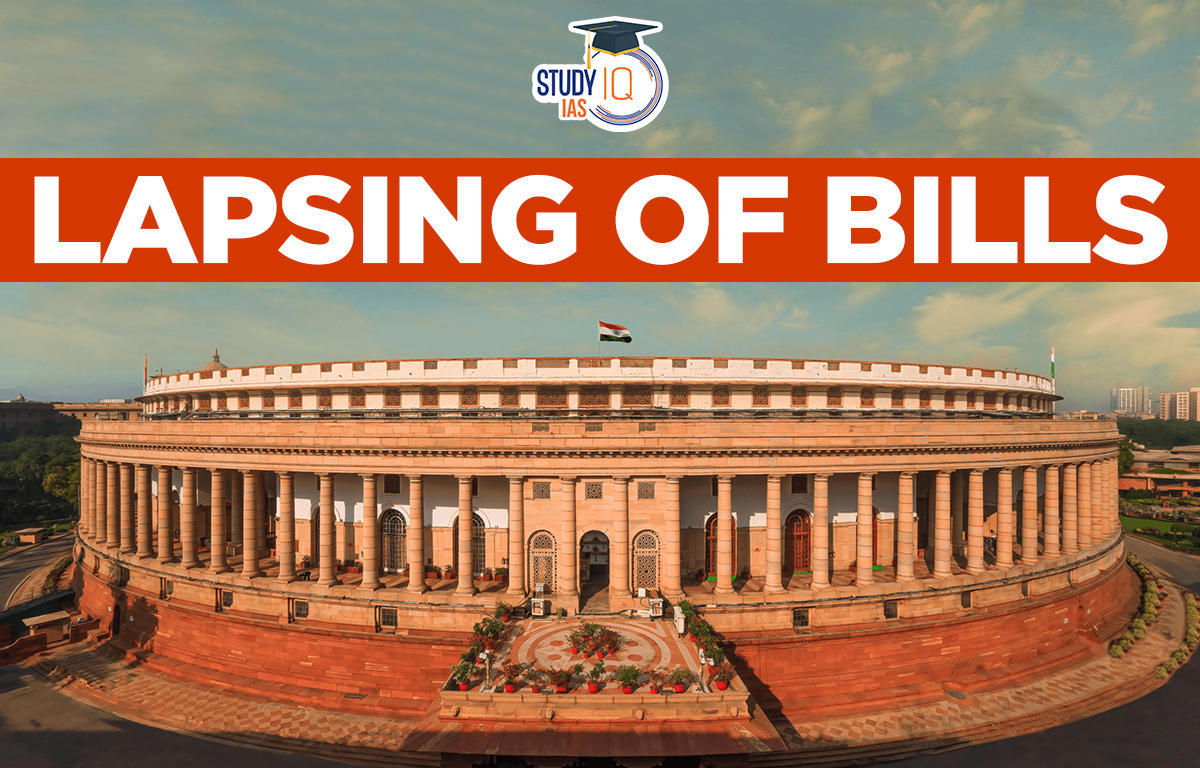Table of Contents
Lapsing of Bills
A bill is a proposal for new legislation (in the legislature). The Lapsing of Bills is the process through which a measure is abandoned in the legislature before it is passed into law. The reasons why a bill expires as well as the situations in which it does not are covered in length in this article. The issues raised by the topic are also highlighted in this article. The Lapsing of a Bills is an important part of Indian Polity which an important subject in UPSC Syllabus. Students can also go for UPSC Mock Test to get more accuracy in their preparations.
Lapsing of Bills Meaning
Every legislative proposal is submitted in the form of a Bill, which is legislation that has been written but does not become law until it receives the President’s approval. In general, the legislature is the government’s law-making body. The Bill must go through three readings in both the Rajya Sabha (Upper House) and the Lok Sabha (Lower House) before being presented to the President of the nation. There are three readings:
- The second reading of the bill includes a debate of its sections and concepts.
- The first reading, which is the introduction of the measure in the House.
- The third reading’s main topic is the debate over Bill’s motion.
Similar procedures are used in the State Legislature. After these readings, the Lower House of Parliament—where the Bill first started—sends it to the Upper House of Parliament. Here is where the idea of “lapse of a Bill” is relevant. One of two things can cause a legislative bill to expire:
- When a Bill is in the Lok Sabha and is awaiting passage into the Rajya Sabha;
- When a Bill is in the Rajya Sabha and has been passed by the Lok Sabha.
In either case, the Bill dies in the Indian Parliament, delaying the process of getting the President’s approval and turning into an Act, or otherwise becoming the law of the land. This article explores the causes of lapsing of bills and throws light on the issue of lapsed bills that subsequently end up costing the Union and the State Legislature.
Lapsing of Bills Rules
Although they are completely different, Rule of Lapse and “Lapsing of Bills” are sometimes confused. Parliament adheres to the annuity rule while approving the annual budget. Accordingly, the funding provided to the government under the budget is for a single fiscal year.
The remaining funds are credited back to the Consolidated Fund of India if the authorized funds are not expended within the allotted year. The ‘Rule of Lapse’ is the name of this rule. Rule of Lapse ensures that the Parliament (Legislature) effectively controls the government’s (Executive) finances.
Lapsing of Bills Reason
A measure that was introduced in the Lok Sabha and is currently being debated in the Lower House is referred to as having lapsed with the dissolution of the House. A Bill that originated in the Rajya Sabha and was passed there but is still pending in the Lok Sabha lapses with the dissolution of the Lower House.
Legislation that starts in the Lok Sabha, is passed there, and then remains pending in the Rajya Sabha is regarded to have expired. A measure that is introduced, approved, and sent to the Upper House by the Lower House with amendments but does not gain the Rajya Sabha’s approval is regarded as having expired on the day the Lower House was dissolved.
No Lapsing of Bills
In some cases, despite the Lower House’s dissolution, certain Bills are not regarded as having expired. a measure that has not yet been approved by the Lok Sabha but was introduced in the Rajya Sabha. Legislation that has been approved by both Houses and is awaiting the President’s signature.
- The law was approved by both Houses but was returned to the Rajya Sabha for further consideration when the president called a joint session before the Lok Sabha was dissolved.
- All pending guarantees and unfinished bills will be examined by the Committee on Government guarantees.
Lapsing of a Bills Consequences
The Trafficking of Persons (Prevention, Protection, and Rehabilitation) Bill of 2018, the Aadhaar and Other Laws (Amendment) Bill of 2019, the Triple Talaq Bills of 2017 and 2018, and the Citizenship (Amendment) Bill of 2019 are among the bills that became inactive following the dissolution of the 16th Lok Sabha. Additionally, the Indian Medical Council (Amendment) Bill, introduced in 1987, is thought to be the oldest bill still in the works after more than 32 years. It should be mentioned that the expired bills were intended to help democratic India’s socioeconomic development, but they ended up hurting the nation. The following outlines the potential effects of a bill expiring:
- The amount of time wasted by the Lok Sabha increases in direct proportion to a bill’s lapse.
- When a bill expires, it shows that the effectiveness of Parliament’s operation is trending towards slowing down rather than speeding up.
- The Houses of Parliament’s productivity suffers when a bill expires.
Lapsing of a Bills UPSC
The topic of a bill expiring is not new, but it continues to be heavily debated due to the impact it has on the Indian government’s legislative body. It should be noted that twenty-two of the fifty-five government bills still pending in the Rajya Sabha as of the dissolution of the 16th Lok Sabha session had expired. Students can read all the details related to UPSC by visiting the official website of StudyIQ UPSC Online Coaching.
























 WhatsApp
WhatsApp